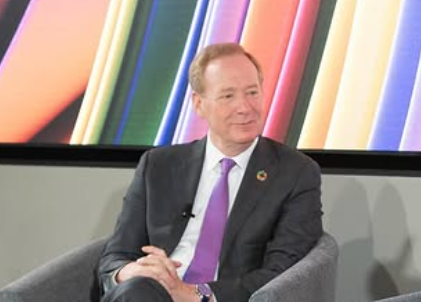Brad Smith is a visionary in the fields of technology, law, and corporate social responsibility in addition to being a business leader. Smith has amassed an estimated net worth of $900 million through philanthropy, policy innovation, and strategic leadership.
Smith has been a driving force behind global digital equity, cybersecurity policy, and AI governance in his roles as president and vice chairman of Microsoft. Not only does his financial success demonstrate corporate leadership, but it also demonstrates his ability to strike a balance between innovation and accountability, ensuring that big tech contributes to the creation of a more moral and interconnected world.
Brad Smith: Key Facts About His Career, Wealth, and Influence
| Category | Details |
|---|---|
| Full Name | Bradford Lee Smith |
| Date of Birth | January 17, 1959 |
| Age | 65 years old |
| Nationality | American |
| Profession | Tech Executive, Attorney, Philanthropist |
| Current Role | Vice Chairman & President, Microsoft |
| Former Role | CEO & Chairman, Intuit |
| Industry | Technology, Business, Law |
| Stock Holdings | Estimated at over $250 million |
| Major Investments | AI Startups, Philanthropy, Higher Education |
| Notable Donations | Over $60 million to education & social causes |
| Marital Status | Married to Kathy Surace-Smith |
| Children | 2 |
| Net Worth | Estimated $900 million |
| Source | Forbes |
From Legal Mind to Tech Titan: Brad Smith’s Road to Wealth
Smith’s career did not follow the typical path of tech founders and startup entrepreneurs who become billionaires. Rather, his financial success was based on innovative policy, legal knowledge, and strategic leadership.
- From Corporate Law to the Legal Guardian at Microsoft
Smith started working for Microsoft in 1993 as a corporate lawyer, handling difficult regulatory matters, antitrust disputes, and international compliance issues. He rose to the position of General Counsel at Microsoft by 2002, leading talks with governments around the world and becoming one of the most powerful legal minds in the tech industry.
Under his direction, Microsoft’s long-running antitrust issues were settled, and the company’s position on cybersecurity, data privacy, and AI ethics was shaped. His ascent to the presidency in 2015 was made possible by his legal expertise, which allowed him to influence corporate governance, policy, and innovation in addition to law.
A Plan of Action for Microsoft and Other Companies
Smith has been instrumental in growing Microsoft’s global presence as president, managing government relations, policy creation, and significant technology projects.
Important Results Under His Direction:
- AI & Ethical Tech Governance: Promoted responsible cybersecurity frameworks and AI policies.
- To stop state-sponsored cyberwarfare, cybersecurity leadership called for a “Digital Geneva Convention.”
- Global Connectivity: Oversaw Microsoft’s Rural Airband Initiative, which increased underprivileged areas’ access to broadband.
- Human Rights & Philanthropy: Developed tech-driven social good solutions in collaboration with the UN.
In addition to improving Microsoft’s standing internationally, his ability to unite technology, law, and policy has strengthened his financial position.
The Wealth & Investment Strategy of Brad Smith
Microsoft is not the only source of Smith’s wealth. His financial portfolio has been diversified thanks to his philanthropic endeavors, leadership positions in technology and education, and strategic investments.
Stock Holdings: Has more than $250 million in shares of Microsoft and Intel.
AI, cloud computing, and cybersecurity are the main areas of focus for tech and startup investments.
Real estate: Owns upscale homes all over the United States.
Smith has made sure his influence goes beyond personal gain by using his financial clout to promote social change and educational reform, in contrast to many tech executives who prioritize wealth accumulation.
The Philanthropic Legacy of $60 Million
Smith’s dedication to giving back is one of the characteristics that set his financial journey apart. He has donated millions of dollars to human rights, education, and technology access projects over the years.
Among his most noteworthy charitable endeavors are:
Marshall University will receive $35 million to support leadership initiatives, tech innovation, and scholarships.
$25 million will go to West Virginia University, which promotes economic growth and education in underprivileged communities.
UN Partnership: $5 million to support technology-driven human rights projects.
Low-income students can apply for STEM scholarships through the Washington State Opportunity Scholarship.
These contributions highlight his long-term view of wealth as a means of making a lasting impact rather than merely as financial success.
What Will Happen to Brad Smith Next?
Smith is still a major player in business, technology, and policy, with a net worth close to $1 billion. His leadership at Microsoft will continue to play a crucial role in determining the direction of moral technology and international governance as AI, cybersecurity, and digital rights emerge as major global concerns.
Although his legacy is already set, his influence will be defined for years to come by his continued efforts in policy reform, philanthropy, and tech leadership. Brad Smith has demonstrated that wealth is about creating a better world rather than just maximizing personal gain through his work in education reform, human rights advocacy, and AI innovation.


